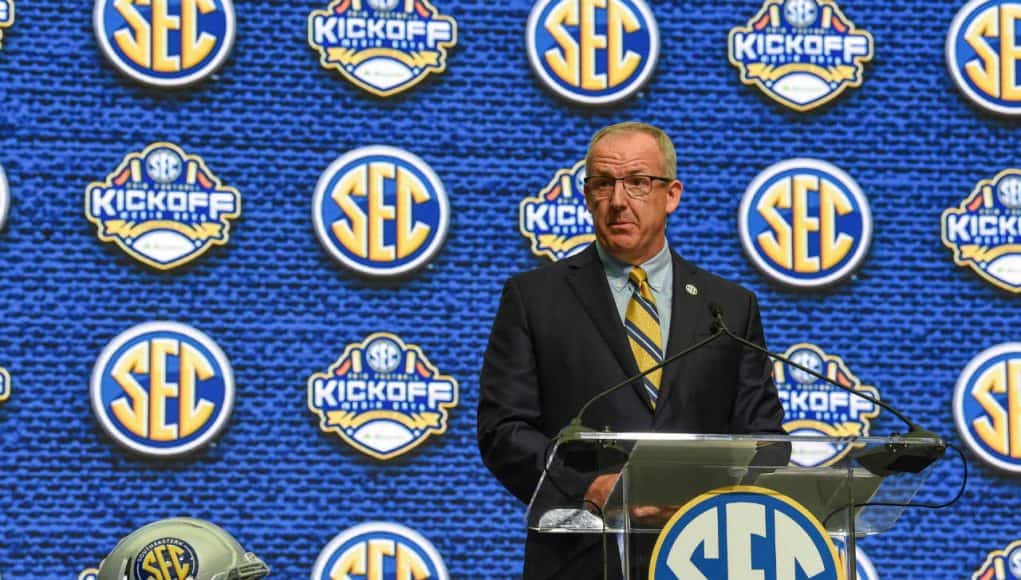According to basically every report from yesterday, the Big Ten blindsided the other Power 5 conferences with its decision to play only conference games this fall. That is, if it plays any sports at all.
People in and/or around the ACC and Pac-12 put out some noises that they’re considering the same thing, although they weren’t ready to make it official yet. The SEC and Big 12 apparently aren’t as far down that road.
But even as other conferences are going to look at making their own decisions along those lines soon, there was reportedly some consternation about the Big Ten going its own way first. There was a regularly scheduled FBS commissioners meeting today, but new B1G commish Kevin Warren went ahead and dropped his announcement yesterday with no warning to his peers.
It’s tempting to say that perhaps it was a sign of his inexperience as a commissioner, but it’s not out of character for conferences to make their own decisions. In the realm of college football, the conferences are the ones who hold the power. They run the postseason, their members make their own schedules, and they employ the referees. The NCAA makes some rules and does some licensing work, but that’s about it. That’s why the NCAA put out a statement yesterday that was 36 words of nothing. It has nothing else to say.
The Power 5 conferences voted themselves some autonomy years ago, and you’ll hear, for instance, SEC commissioner Greg Sankey use the phrase “Autonomy 5” instead of “Power 5”. It is his way of trying not to sound like he’s denigrating the Group of 5 non-power conferences, I guess. What the Big Ten showed yesterday is that there is quite a bit of autonomy within and between the Autonomy 5, and it clearly rankled some in other leagues.
There are no easy decisions to be made in the face of the COVID-19 pandemic, but the preexisting fractures in the college sports world have really come to light.
Unlike with the College Football Playoff, the NCAA directly runs March Madness. It made the call back in early March to cancel the tournament. Even though it was the only decision to make at the time, the conference commissioners felt chafed that the NCAA didn’t consult them first. Now, we have administrators the country over mad at the Big Ten for going alone on its decision to play conference games only this fall.
I would like to think that in the face of natural disasters, people would be more understanding and patient with each other. However, it’s manifestly not true at least in the college sports context. There is still simmering resentment between some Florida and LSU partisans over the way things went down with Hurricane Matthew and the game’s rescheduling four years ago. Hard feelings generated now have the potential to be much worse.
I don’t know that there will be much friction between the Big Ten and its Group of 5 and FCS opponents that are now out games. The B1G schools have an incentive to pay out at least some of what the contracts owe because they’re going to want to schedule those kinds of schools in the future. The G5 and FCS teams have an incentive to settle rather than try to go to court because they’re going to want to sign up for payday games in the future.
Among the Power 5 leagues, they still have an incentive to play nice to a certain degree because they’ll have to in order to keep the TV money gravy train rolling. They run the Playoff as a joint venture, and they’re not going to set all that cash on fire over hurt feelings.
And maybe that’ll be enough for a lot of things. The Big Ten, along with the SEC, is one of the top tier of the Power 5 conferences. It also has no marquee non-conference series, so it can afford to go it alone. It’s not like how the SEC and ACC have several historic rivalries between teams, or how a couple of Pac-12 teams play Notre Dame annually.
But the more these leagues do things on their own, the harder it will be to get coordination in the short term. It makes sense for a league to play only conference games because they can ensure a certain baseline of testing and scheduling flexibility. The Big Ten has far more money for COVID-19 tests than the MAC does. That’s really what it’s about more than travel; Rutgers and Nebraska are nowhere near each other but they’re scheduled to play this year as of now.
The other P5 leagues have plenty of money too, though, and they could’ve spent the summer working together to create a standard across them all. They could’ve been working on scheduling arrangements too, so that if, say, Florida and Ohio State each lose their opponent to quarantine in the same week, they could call an audible and play each other. Who gets to be home and who has to be away? That could’ve been hammered out now so there are no surprises.
To whatever extent they had been working on such plans behind closed doors, that cooperation is probably on thin ice with the Big Ten unilaterally making a choice without telling anyone else about it. What kind of trust is there to build on now?
Again, there’s too much money at stake for college sports to splinter into oblivion, but it could get very ugly in a hurry.


